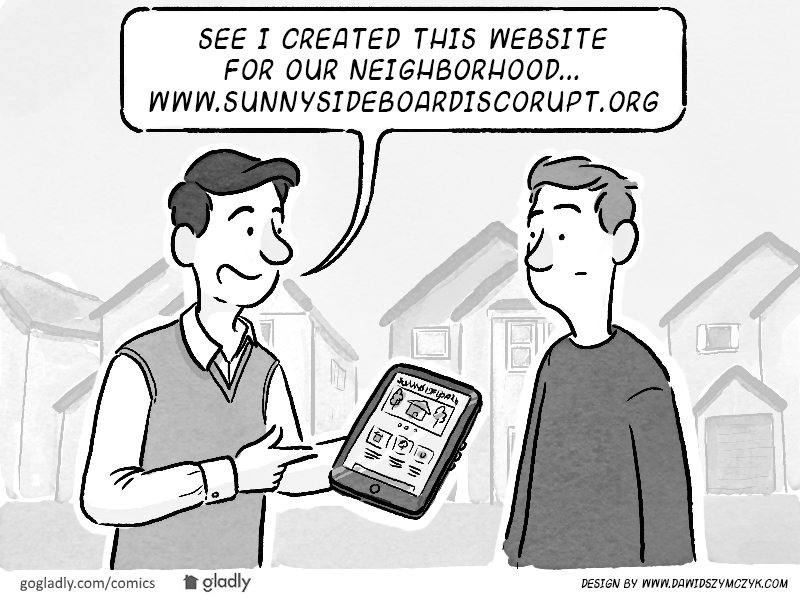While technology has many advantages, the internet and social media has led to a decline in human interaction between neighbors. For as little as $0.99, anyone can create a website. Many homeowners associations are behind the times and have not yet created their own HOA website, let alone registered for a HOA website domain name. Accordingly, when neighbors are not neighborly, and tempers flare, the creation of a dissident website (fake HOA website) using the name of the homeowners association is becoming an increasing popular way for members to voice their dissatisfaction. What should a homeowners association do when this happens?
Do Association Members have free speech rights in a HOA?
Upset co-owners typically resort to the First Amendment as a basis for allowing a dissident website. The prevailing view is that the First Amendment only applies to government actors and not private homeowners association. However, this is not always the case as some courts have determined that homeowner associations are “quasi-governmental” entities. Accordingly, a board should check with its legal counsel to determine whether the First Amendment applies to private community associations in their state.
Does free speech have its limits?
Even if the First Amendment is applicable, a dissident website frequently uses the name of the homeowners association, a domain name that includes the name of the homeowners association and, for all intents and purposes, gives the appearance of an “official” association website. While each case is fact specific, a homeowners association has federal and states trademark rights in its own name. Similarly, defamation claims can be made for statements that are not factually true. In short, free speech rights do not necessarily give a member of a community a right to utilize the association’s name and to say whatever they please without consequence.
How to prevent the creation of a fake HOA website
- If the state does not apply the First Amendment to the Homeowners Association, the Association should look into adopting bylaws and/or rules and regulations that regulate “gripe” websites.
- Register the name of the Association as a trademark.
- Purchase all domain names that utilize the Association’s name.
What to do when the line is crossed?
- Send a cease and desist letter.
- File a complaint with the website provider.
- Sue for injunctive relief to remove the fake HOA website.
- Sue for damages caused by the improper website.
- Dissident or Fake HOA Website:Is Free Speech Really Free? - March 31, 2016



 Help
Help
When associations step up to transparency and publish their own private Web sites for all in the community to use, a dissident site can quickly and effectively be overwhelmed.
In some condos, the only way a disgruntled owner, or group of owners, can try to inform the owners of their views and concerns is through a website.
The website does have to stay within certain bounds like this page shows:
http://www.condomadness.info/organizing-libel.html
Spot on Mr. Herzil! Our upcoming meeting is covering exactly what you’ve written about – though we are also including social media part of the highlights on official & unofficial online homeowners’ transparency. Mid 1990 my own HOA had to make “unofficial” the background and primary keyword for our first website because the Board of Directors had not sanctioned it. This is also key to a good functioning HOA – know the parameters – Community Associations Institute (CAI) was on the leading edge of online efforts for homeowners and their guidance saved many. Your article too is a great reminder – thank you for your steadfastness.
Sorry to be so Internet Technical but this is what I do.
Just want to expand on Domain Names vs trademarks.
Internet Global Domain Name registration and local trademark
Current Case law has established that trademark protection does apply to cyberspace. Many courts tried to expand the traditional trademark law to domain name cases, but find courts have they lack jurisdiction over the Internet. The reason, it is difficult to have someone’s registered Domain Named changed due to a trademark name issue. The Internet is global and local court actions are not enforceable globally.
Domain Name Basics;
To reach another person on the Internet you have to type an address into your computer — a name or a number. That address must be unique so computers know where to find each other. ICANN coordinates these unique identifiers across the world. Without that coordination, we wouldn’t have one global Internet.
Who Controls Internet Domain Names and IP addressing.
ICANN, Internet Corporation for Assigned Names and Numbers is primary responsibility is to manage the Internet’s core infrastructure, which consists of IP addresses, domain names, and root servers. It coordinates the Internet’s DNS, IP addresses and autonomous system numbers, which involves a continued management of these evolving systems and the protocols that underly them.
If you think someone Domain Name infringes on your name the following actions must be taken.
1) the manner in which the domain name(s) is/are identical or confusingly similar to a trademark or service mark in which the Complainant has rights; and
(2) why the Respondent (domain-name holder) should be considered as having no rights or legitimate interests in respect of the domain name(s) that is/are the subject of the complaint; and
(3) why the domain name(s) should be considered as having been registered and being used in bad faith
This process can take several years. The best method for protecting you name is to purchase all Domain Names using your trademark name. It is important to know that Domain Names are used in the Internet and Cyberspace and trademark protection does not apply.